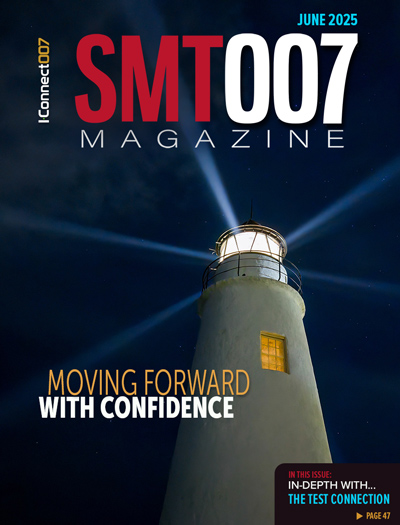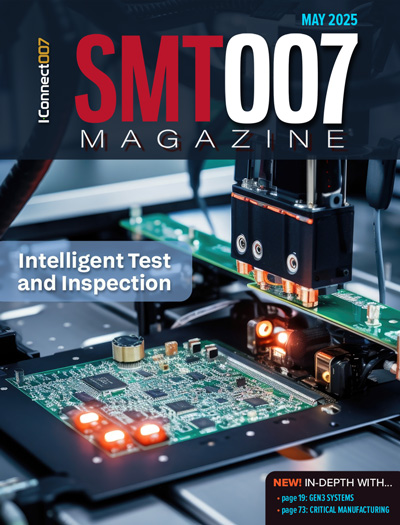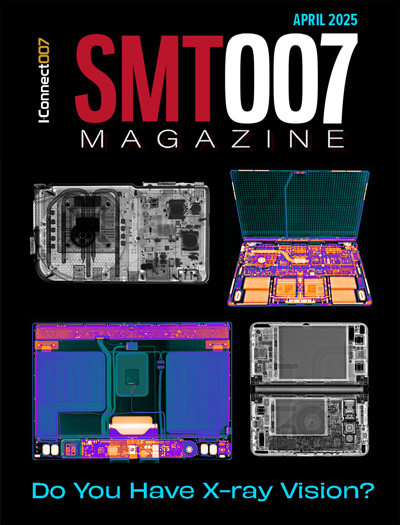-

- News
- Books
Featured Books
- smt007 Magazine
Latest Issues
Current Issue
Moving Forward With Confidence
In this issue, we focus on sales and quoting, workforce training, new IPC leadership in the U.S. and Canada, the effects of tariffs, CFX standards, and much more—all designed to provide perspective as you move through the cloud bank of today's shifting economic market.

Intelligent Test and Inspection
Are you ready to explore the cutting-edge advancements shaping the electronics manufacturing industry? The May 2025 issue of SMT007 Magazine is packed with insights, innovations, and expert perspectives that you won’t want to miss.

Do You Have X-ray Vision?
Has X-ray’s time finally come in electronics manufacturing? Join us in this issue of SMT007 Magazine, where we answer this question and others to bring more efficiency to your bottom line.
- Articles
- Columns
Search Console
- Links
- Media kit
||| MENU - smt007 Magazine
RIKEN Adopts Siemens' Emulation And High-Level Synthesis Platforms for Next-Generation AI Device Research
January 16, 2025 | SiemensEstimated reading time: 2 minutes
Siemens Digital Industries Software announced today that RIKEN, a national research and development agency in Japan, is enhancing its research on next-generation AI devices with Siemens' comprehensive Veloce™ Strato CS emulation and Catapult™ High-Level Synthesis (HLS) platforms to conduct architecture and design space exploration of AI accelerator devices.
“RIKEN’s adoption of Siemens’ emulation and HLS capabilities enables the team to conduct the necessary explorations during our research into next-generation AI devices for ‘AI for Science’ and maintain our position as the creators of the world’s most powerful supercomputer,” said Dr. Kentaro Sano, team leader of the Processor Research Team at the Center for Computational Science, RIKEN. "Our goal is the establishment, management, and continuous enhancement of the computational infrastructure essential for the creation of generative AI models tailored for scientific discoveries – and Siemens’ tools play an essential role in this research.”
The RIKEN Center for Computational Science, part of Japan’s largest research organization for computational science and a world leader in a diverse array of scientific disciplines, is known for developing supercomputers such as the K computer and Fugaku.
Dr. Kentaro Sano, team leader of the Processor Research Team at RIKEN Center for Computational Science (right) and Yukio Tsuchida, vice president for Japan, Electronic Design Automation, Siemens Digital Industries Software (left)
"We are delighted to support RIKEN's groundbreaking research on AI devices. Our latest Veloce Strato CS and Catapult HLS platforms provide RIKEN with the comprehensive tools to achieve their research goals and drive innovation in the field of AI," said Jean-Marie Brunet, vice president and general manager, Hardware-Assisted Verification, Siemens Digital Industries Software
"Siemens is incredibly proud to support the cutting edge research and development taking place at RIKEN, and we look forward to supporting the organization as it works to achieve its goals to explore the outer boundaries of what’s achievable when bringing the power of AI to scientific research at vast scale," said Yukio Tsuchida, vice president for Japan, Electronic Design Automation, Siemens Digital Industries Software.
The combination of Siemens’ hardware-based Veloce Strato CS and Catapult HLS platforms provide RIKEN with world-class technology for enabling rapid synthesis and emulation of large-scale Application Specific Integrated Circuits (ASICs). These Siemens tools support RIKEN's efforts in evaluating the performance of optimized AI computing circuits and the system-on-chips (SoCs) that incorporate these circuits. The AI accelerator developed through this research will be a candidate for deployment in the next-generation supercomputers following the supercomputer Fugaku , scheduled to start operation around 2030 at the latest.
Suggested Items
IDC Increases its PC and Tablet Forecasts Despite Tariff Uncertainty
06/02/2025 | IDCAfter recording strong results in the first quarter of 2025, IDC is increasing its traditional PC forecast for 2025 — this comes despite the significant impact that US tariffs have had on its trading partners’ market sentiment.
IonQ Signs MoU with KISTI to Accelerate South Korea’s Role in the Global Quantum Race
06/02/2025 | IonQIonQ, a leading commercial quantum computing and networking company, today announced the signing of a memorandum of understanding (MoU) with the Korea Institute of Science and Technology Information (KISTI), a leading national science and technology research institute and supercomputing center.
Stephen Winchell Appointed DARPA Director
06/02/2025 | DARPAStephen Winchell was sworn in today as the 24th director of the Defense Advanced Research Projects Agency.
Hon Hai Research Institute Partners with Taiwan Academic Research Institute and KAUST to Participate in CLEO 2025
05/30/2025 | FoxconnThe research team of the Semiconductor Division of Hon Hai Research Institute, together with the research teams of National Taiwan University and King Abdullah University of Science and Technology in Saudi Arabia, has successfully made breakthroughs in multi-wavelength μ -LED technology to achieve high-speed visible light communication and optical interconnection between chips.
UNIST, SK On Strengthen Collaboration to Cultivate Battery Talent and Enhance R&D Capabilities
05/28/2025 | UNISTUNIST announced its plans to deepen collaboration with SK On to foster talent in the battery industry. This strategic partnership aims to attract outstanding researchers, broaden the foundation of research and development, and secure future competitive advantages.


